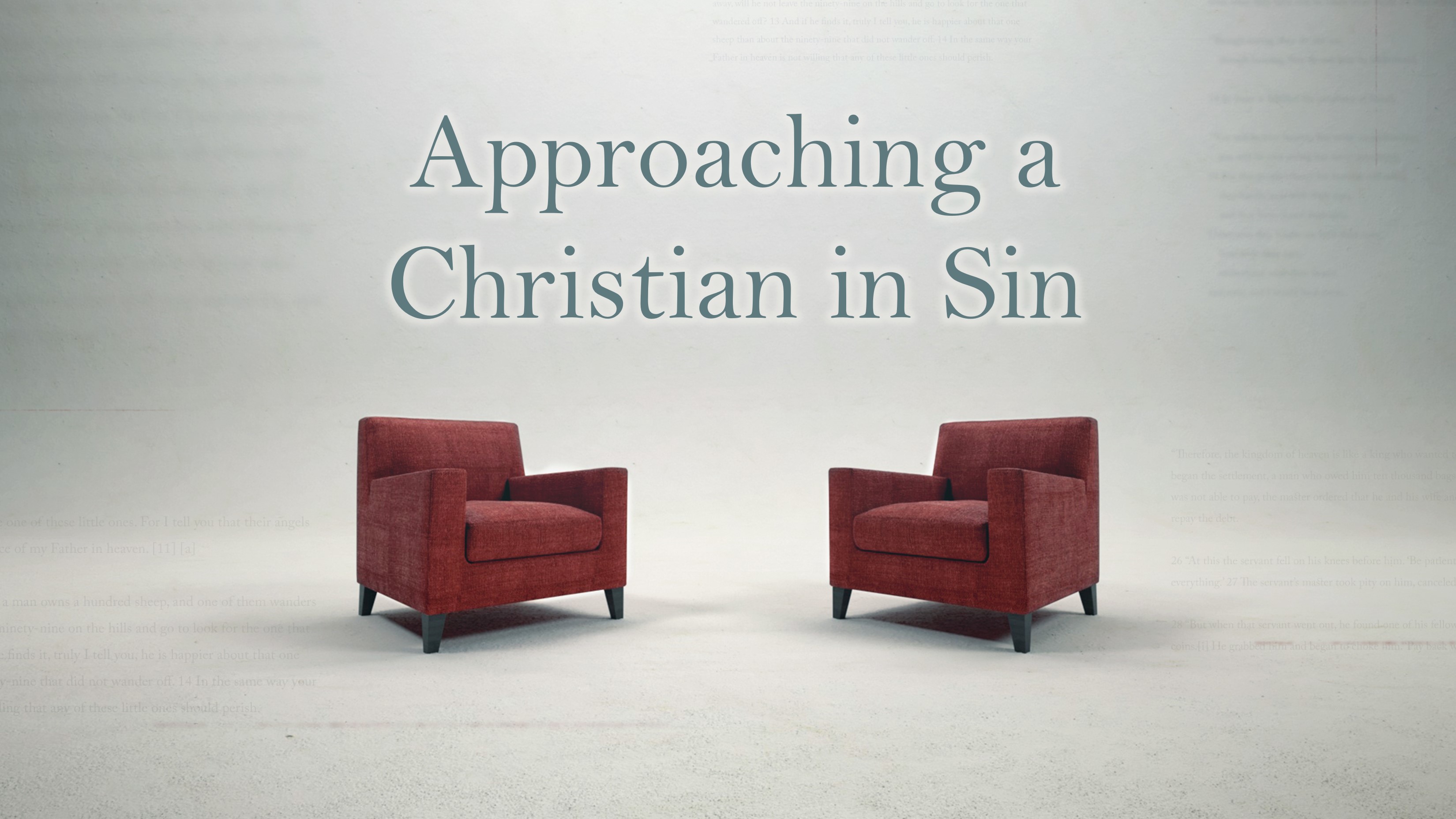Blog
Conscience and the Government
Wednesday, September 15, 2021
There is nothing in the Bible about masks or vaccines. However, the Bible does discuss submission to the government and liberty of conscience, and both of these principles lead to some straightforward mask-and-vaccine applications. If the government tells us to do something, we do it (unless it asks us to disobey God’s commandment). Similarly, we respect others’ judgments about masks and vaccines, especially when we don’t agree with those judgments.
By contrast, the interaction between conscience and government is harder to sort out. What if I am conscientiously opposed to masks/vaccines, but the government requires me to mask and/or vaccinate? Does submission to the government come first, or does my conscience?
Many brethren have adopted the latter position. They point to Scriptures such as Romans 14:23, which reads in part, “Everything that is not from faith is sin.” Because they feel like masking/vaccinating would be sinful for them, they must not do either, even if the government requires it.
I presume that these Christians are reasoning in good faith, but they don’t take into account the context of Romans 14:23. Romans 14 isn’t a passage about how to handle God’s law; it’s a passage about the role of the individual conscience in areas where God has given us liberty.
We are at liberty to eat meat. However, if we think it’s wrong to eat meat but eat meat anyway, we sin against our conscience. In areas of liberty, what is not from faith is sin. When we move outside the realm of liberty, though, we also move outside the realm of Romans 14 and apply Romans 14:23 where Paul does not.
This is a fraught step. Once we start using our conscientious conviction to override one of God’s laws (His commandment to submit to the government), we open the door to others overriding God’s other laws because of their conscientious convictions.
Consider, for instance, the feminist who believes in absolute equality between the sexes and thinks it would be morally wrong for her to submit to her husband when she strongly disagrees with him. Such women certainly exist. We come to her with Ephesians 5:22, but she replies, “I can’t submit to my husband because my conscience won’t allow it.”
If we refuse to submit to the government because of our conscience, how can we tell her that she must submit to her husband despite her conscience?
Through this open door, anything can and will come. There are people who feel morally bound to set the words of an earthly religious leader as equal to the word of God. There are others who are utterly convinced that it is right for them to marry and have relations with someone of the same sex. All of these people will argue against keeping divine commandments because of conscience.
If we disobey divine commandments because of our conscience, what do we have to say to any of them?
Defying the government because of our conscientious convictions sounds very noble, but it really amounts to defying the law of God. It is nothing more than the old rule of Judges 21:25 beneath a veneer of American individualism. Once we start doing what is right in our own eyes, we must grant others the license to do what is right in their eyes too.
Approaching a Christian in Sin
Tuesday, September 14, 2021
As the elders here have requested, every year Clay and I preach at least one sermon on the process for withdrawing from a Christian who is living an ungodly life. Obviously, neither one of us has any problem with doing so. It’s part of the whole counsel of God, and our job as preachers is to declare it along with the rest.
However, I worry that across the brotherhood, sound teaching on withdrawal can lead us to unsound conclusions. We can infer first that God’s solution to the problem of unrighteousness in the church is withdrawal, and second that going to such Christians is the elders’ business and not ours.
Both of these conclusions are wrong. God does not want to see those brethren withdrawn from; He wants to see them repent and be restored. Second, He wants to see every single one of us involved in that restorative work.
Sad to say, it is all too rare for Christians to go to a brother who needs help. We don’t want to get involved in a messy situation, and we’re afraid of having a difficult conversation. Nonetheless, these things are part of our responsibility before God. To help us carry out this responsibility, let’s consider the example of the apostle Paul in approaching a Christian in sin.
As we analyze this issue, we’re going to be looking at 2 Corinthians 13:1-10. We almost never study this text, but it shows us clearly what Paul’s strategy is for dealing with sin in the Corinthian church. The first thing we learn from him here is to ADDRESS THE PROBLEM DIRECTLY. This appears in 2 Corinthians 13:1-4.
The first thing that we see Paul doing is seeking a face-to-face conversation. Letters haven’t gotten the job done, so he is going to go to Corinth in person to resolve things. I think that modern-day American Christians struggle with doing this for two main reasons: our society is averse to direct conflict, and we prefer electronic communication to in-person communication.
Consequently, we are much more likely to talk about a straying Christian (which is gossip) than we are to talk to them. If we do talk to them, we’re much more likely to use a text or a Facebook message than we are to have a sit-down conversation.
The first is obviously evil, but the second is a mistake. I’m here to tell you: I spend more time on social media than almost anybody, and writing is the thing that I do best in all the wide world, but trying to persuade somebody in writing on social media is a waste of time. No matter how good a writer you are, writing can’t contain the non-verbal cues that are a vital expression of love and goodwill. There is no substitute for looking somebody in the eye and telling them lovingly that they need to repent!
Second, we must be willing to speak with authority. Notice that Paul warns the Corinthians that he is going to be coming to them in the power of God. When he shows up, nobody is going to be able to disregard him!
Obviously, none of us are apostles, but we still can speak with the authority of God. We do that when we use the word to convict the sinner. Again, this is not our natural tendency. Even if we’re having that face-to-face conversation, we’re inclined to dance around the problem and not say the hard truths that need to be said. This might seem kind, but in reality it is deadly because it allows the straying Christian to continue in the delusion that they are not in danger. If somebody is in sin, we need to show them their sin, citing book, chapter, and verse if necessary. Our speech must be gracious and loving, but it also must be clear and plain.
The second part of Paul’s strategy is to ENCOURAGE SELF-EXAMINATION. This is exactly what we see going on in 2 Corinthians 13:5-6. Frankly, I think this highlights a way in which brotherhood culture is much too debate-centric. In a debate, there’s a winner and a loser as judged by a third party. If you win, it doesn’t matter whether you’ve convinced your opponent or not. You’ve still won.
I believe that there’s still a place for debate today. My brother and friend Bruce Reeves is a skilled debater, and he does valuable work for the kingdom. However, I think that place is much narrower than we often think it is. In our preaching and teaching, it’s awfully tempting to get up and own the denominations or get up and own the liberals, and at the end we congratulate ourselves because we won the debate against somebody who wasn’t even in attendance.
So too, I’ve seen Christians try to correct those in error by winning the debate against them. “I’ve proven A, B, and C, so you’re a sinner. Boom! Done!” To be honest, I’ve been that Christian. However, that behavior reveals a fundamental misunderstanding of the restoration process.
We don’t win by winning the debate, at least according to us. We only win when we convict the sinner. We win when they listen to what we’re saying, internalize it, use it to indict themselves, and say, “You know, you’re right. I need to change.” That’s what a win looks like.
In striving for this goal, we should use the lightest touch possible. Much of the time, the straying brother or sister has 99 percent indicted themselves already, and they just need a little nudge to get them back on the right track. On multiple occasions, I’ve persuaded a Christian who hasn’t been assembling to come back simply by asking them via Facebook message what they’ve been up to recently. They know. They have a good heart. They just need a little help.
Third, we must SEEK THE OTHER’S GOOD. Paul exemplifies this in 2 Corinthians 13:7-10. He makes clear that his concern isn’t his position or his reputation. It’s the souls of the people he loves.
Let’s put ourselves into this passage for a moment. Imagine that you are driving by a liquor store in town, and you happen to notice a sister’s minivan parked there. The next time you drive by, you see the minivan again. Third time, you see the same thing.
You decide you need to talk to Sister Irma. After services one Sunday, you ask her, “I’ve been seeing your car parked at Buzz’s Liquors an awful lot. What’s going on?” In response, Sister Irma explains that she’s been baking a lot of bread recently, and the kind of yeast that she prefers is only available in the brewing-supplies section at Buzz’s Liquors.
How do you feel? Embarrassed that you brought it up? Angry that you look like a fool? Disbelieving that yeast is all that Sister Irma is buying? Or, instead, are you relieved that she hasn’t become an alcoholic?
Paul’s perspective is clear. He tells the Corinthians that he would rather show up and prove to be wrong about them than show up and be right about their sins. He doesn’t care about being right himself. Instead, he cares about the Corinthians being right with God. He prefers to be wrong because then the Corinthians don’t have to repent! The soul of the other Christian should be our priority, and if it is, that will be evident in everything we say.
The Goal of Our Instruction
Monday, September 13, 2021
In 1 Timothy 1:3-7, Paul distinguishes between bad teaching and good teaching. The former category is much larger than we might expect. It includes false doctrine, but it also involves empty speculation, fruitless discussion, and opinionated ignorance. As a rule, brethren are alive to the dangers of the first of these, but we often don’t pay as much attention as we should to the problems that come with the other three.
As Paul describes it, empty speculation arises from paying attention to myths and endless genealogies. In essence, this is spiritual reasoning without a solid Scriptural foundation. It is speculative because it relates tangentially at best to the word of God, and it is empty because it does not help the hearers inherit eternal life.
Such speculation is rife across the religious spectrum. It arises from progressives who want to overturn divine commandments based on what they think they know about life in the first century as well as from conservatives who want to speak clearly where the Bible does not. We may find its conclusions congenial, but it represents a trap for those who wish to follow Christ.
Second, we come to fruitless discussion. Such discussion is fruitless because it does not achieve the good goals Paul sets out in v. 5. It does not produce love from a pure heart, a good conscience, or a sincere faith.
To put things another way, it does not transform our hearts to be like God’s heart, it does not instruct us in God’s commandments and how to obey them, and it does not show us that God is and that He is a rewarder of those who seek Him. These discussions often arise from nonbiblical sources (beware of studies on marriage and the family that do not cite Scripture!) or take the Bible and turn it irrelevant. A discussion of the minutiae of ancient life 2000 years ago without any connection to anything is not spiritually beneficial!
Finally, we come to opinionated ignorance. In this case, the problem isn’t the topic. It’s the teacher. He’s talking about a worthwhile subject, but he’s not doing so in a worthwhile way. He doesn’t understand the word properly, but that doesn’t keep him from insisting on his conclusions obstinately.
As teachers, we solve this problem not by avoiding the area of study entirely, but by making sure that our understanding of it is good. We must know both what we believe and why we believe it. For instance, it’s not enough to cite 1 Corinthians 16:1-3 as an explicit authorization of a weekly collection for the continuing needs of the church. It isn’t. Instead, we must know how to use 1 Corinthians 16:1-3, along with passages such as Acts 4:34-35, 1 Corinthians 9:14 and Hebrews 10:25, to reach the conclusion that a continuing collection is authorized. If we can’t work through the reasoning necessary to arrive at a conclusion, we shouldn’t be teaching the conclusion.
All of this makes preaching and teaching sound like a challenging work, and it is. If we want to be useful in the kingdom, there are many pitfalls we must avoid. Nonetheless, sound preaching and teaching is vital to the spiritual health of the Lord’s people, and if we carry out this great work with care and diligence, we will gain an everlasting reward.
Masks, Vaccines, and the Bible
Thursday, September 09, 2021
I originally wrote the following as a comment on a Facebook post by Tony Mauck. Having written it, I decided to give it wider distribution. I believe it correctly restates the Biblical principles that should govern our speech and behavior when it comes to masks, vaccines, and discussion of the same.
- In areas where we are given liberty by man and God, we must respect the liberty of others. We must not judge or show contempt toward those who use their liberty differently. (Romans 1:1-3)
- When we talk about these things, we must speak graciously and in a way that edifies everyone. Speaking in a contentious, self-righteous, angry way is ungodly. (2 Timothy 2:23-25)
- Elders must not lord it over the flock but rather lead by force of example. (1 Peter 5:3)
- Christians under elders must obey, submit to, and follow them, so that their conduct gives the elders joy rather than grief. "Am I making the elders' work harder or more unpleasant?" is a very important question for all of us to ask. (Hebrews 13:17)
- Christians must obey the government, saving only the times when it commands us to do something that directly contradicts the law of God. (Romans 13:1-3)
- We must not confuse our personal convictions, whether based on conscience, our understanding of the Constitution, or anything else, with the divine commandment. If we do, we likely will fall into serious error. (Acts 26:9-10)
Out of the Depths
Tuesday, September 07, 2021
The other day, I was talking on the phone with a dear friend of mine who is writing a book about the fear of God. She’s doing this in part because of her concern that the Lord’s people aren’t discussing the fear of God as much as they should be. We like to hear about grace and mercy, but we’re not so fond of teaching about the fear due our Creator.
I found this particularly striking because like sin and grace go together, fear and mercy go together. If it is not a fearful thing to fall into the hands of the living God, then God’s mercy to us doesn’t matter much either. None of us are deeply appreciative when the doctor fixes our hangnail!
It’s obviously true that God’s fear leads us to appreciate His mercy. Though it’s less obvious, it’s also true that His mercy leads us to fear Him. Indeed, if our appreciation of the forgiveness of God doesn’t produce the fear of God, we’ve missed something. This morning, then, let’s see how this idea emerges, along with many others, when we cry to God out of the depths.
Naturally, we’re going to be studying Psalm 130, and the first portion of this psalm concerns A GOD WHO LISTENS. Look at Psalm 130:1-2. Even in this introductory section, there are two valuable lessons for us to consider, and the first is that even God’s people can find themselves in the depths.
Even in English, the idea of crying out to God from the depths is powerful, but in Hebrew, it is even more so. To the Israelites, the depths were a place of primordial chaos, and if you were in them, it was a sign that you had been cast out from the presence of God. This is why Jonah is swallowed by a great fish that goes down into the depths. We can end up there too, whether because of sin or tragedy. Things can get so bad in our lives that we feel isolated from every source of goodness.
This certainly is where the psalmist believes himself to be, but even though he is there, even though we might be there, calling on God is always possible. This one seems like a sin problem. The psalmist has sinned so egregiously that he has ruined himself, but even there, he cries out to God in the hope that God will listen.
So too for us. It’s possible for Christians to wreck their lives utterly, and some do. Nonetheless, as long as we are alive, it’s never too late to seek the Lord. Everything else may be gone, but if we humble ourselves and come to God, we are sure to find Him.
The second part of the psalm is about FORGIVENESS AND FEAR. Let’s keep going in Psalm 130:3-4. This is not the way that any of us would have written it. We might have said, “If You marked iniquities, we would be afraid of You, but since You offer forgiveness, we rejoice in You.”
That’s not where the psalmist goes, though. Instead, he asks rhetorically who could stand before a God who remembered sin. We know the answer to that one. Not I. Not any of us. Imagine if that were what existence was like. There is a God, He knows everything we do, and one day He will condemn us, fairly but unmercifully, according to His perfect standard. I haven’t found many depictions of the afterlife that make nihilism look attractive, but that one does. If all we had to look forward to were eternal torment, we would long not to exist, and there would be no point to anything.
However, that is not who God is! He will execute justice if we force Him to it, but He longs to forgive, and His forgiveness makes fearing Him make sense. Who would worship a God who is just going to squish them no matter what? On the other hand, because mercy is on the table, we have a reason to honor Him, to revere Him, and to follow His commandments. Mercy and fear aren’t opposites. Instead, they work together.
In the third part of this psalm, we see a truly beautiful description of WAITING FOR THE LORD. It appears in Psalm 130:5-6. The first part of this section, though, explains why waiting for the Lord makes sense at all. We wait because we hope in His word. The better we know the Bible and its promises, the more motivation we have to trust God. Conversely, if we don’t know the Scriptures, we will find waiting on the Lord to be very hard.
This tells us, then, that Bible study is one of the most important tools we have for preparing for disaster. My crystal ball is broken these days, but this I know: the day will come for every one of us when we have no other hope but God. The time we spend with the word now will give us the assurance we need then to persevere through trial.
This is necessary because in the midst of disaster, waiting for the Lord isn’t easy. In one of the loveliest figures of speech in the whole Bible, the psalmist says he waits for the Lord more than watchmen wait for morning. I’ve never been a night watchman, but I can imagine what it’s like, especially back in the day when every little village needed one. It’s boring, it’s frightening, it’s miserable, and it’s dangerous. How grateful the watchman would have been to see the sun rising and realize that he had made it through the night without being eaten by a lion or slaughtered by a Philistine!
Waiting for the Lord is like that, only more so. There have been times in my life when the seconds dragged by, when the minutes felt like hours because of the depth of my despair. And oh! How eagerly I waited for deliverance from God. In times like that we long for Him because nothing and no one else can help.
The final portion of the psalm explores further the value of HOPING IN THE LORD. Let’s conclude our reading with Psalm 130:7-8. Hoping in God isn’t only for the psalmist. It’s for all of His people.
This is because of God’s faithful love. As always, when we see “faithful love” or “steadfast love” or “lovingkindness” in our Old Testaments, we should think chesed, that untranslatable word that is probably the best single-word description of the whole Bible. Chesed is the great covenant love of God, the love expressed in action that continues despite everything.
Right now, God regards every single one of His people with chesed. He feels this faithful love for me and for every Christian in this room, right now. Because it is faithful love, we can be sure that God will make His goodness known in our lives again. However massive the mess, however deep our grief, sooner or later God will make it right.
His chesed for us also leads him to offer redemption that is not minimal or grudging but instead abundant. Because of God’s faithful love for His people, He eagerly overflows with grace for all of our transgressions. We don’t have to worry that the greatness of our sins has exhausted His mercy. As long as we return, He always has more to give.


